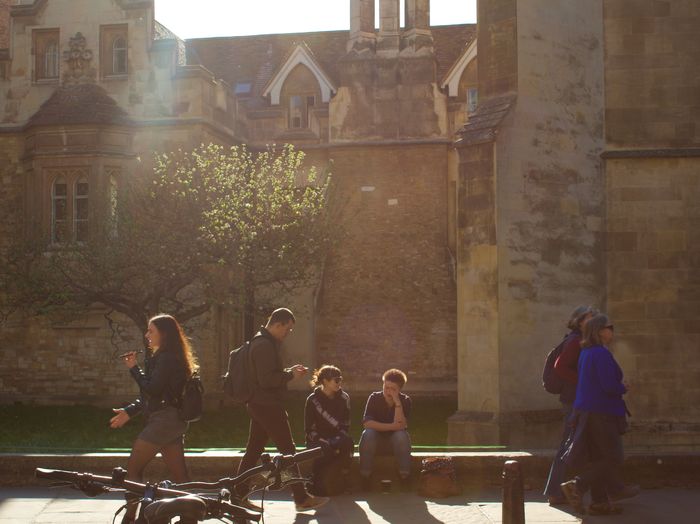‘I’m just hoping they don’t find out’: Students who work a job during term
Sobaan Mohammed speaks to six students who work despite Cambridge’s ban on paid employment

Sarah, an international student, works 20 hours a week across three jobs. She struggles with managing her job and degree, and when she’s working a shift on the weekend, she doesn’t have the time to write essays. She works so that she can afford her tuition fees and living costs for the next two years. “I’m just hoping that they don’t find out”, she remarks, “because I don’t think you’re allowed to work as a Cambridge student.”
A recent Sutton Trust report revealed that 27% of university students have taken up a job or increased their shifts in order to make ends meet as a result of the cost of living crisis. Yet Cambridge is one of the few universities that discourages students from undertaking employment during term, even though its cost of living support pales in comparison to other universities. “Being a student in Cambridge is pretty expensive,” says Elizabeth, a first-year English student.
“Employment that benefits the university or its colleges is seen as acceptable, while other forms of work are not”
Despite this rule, some students still work a job during term. Listening to some of their experiences revealed the struggle they face of managing both their job and degree, a sense of secrecy about their job, and concern about the rising cost of living.
“This is quite difficult,” remarks Lily. She is a first-year student who works around 20 hours a week at a bakery. Most of her shifts are on the weekend, but she sometimes picks up shifts on weekday mornings when her lectures are in the afternoon. Keeping on top of work is a challenge because she is “always tired”, but she needs to work in order to financially support her family.
Sarah hopes that staying on top of her degree and essay deadlines will avoid raising any suspicions about her job. So far, only her friends are aware that she works. As an international student, the number of hours she can work is restricted to 20 hours per week by student visa regulations. “When you’re an international student, you always have to be very careful with what you do.”
The students also fear unsympathetic responses from members of staff and all doubt whether their DOS or tutor would understand their circumstances. “They would make me quit,” says Lily.
“Managing studies and a job while staying under the radar is a delicate balancing act”
To some extent these attitudes seem to differ by college. Elsa is employed as a library assistant by a Cambridge college; this, coupled with the other job opportunities available to students – like working in a college bar or as a CAMbassador – suggest that the rule surrounding paid work is not as rigid as it seems. Employment that benefits the university or its colleges is seen as acceptable, while other forms of work are not.
The students also point out that demanding extracurricular commitments – such as rowing, journalism, or theatre – are normalised features of Cambridge student culture. In most cases, these commitments demand the same hours, if not more, as any job, yet they are not typically discouraged. Again, there seems to be an inconsistency about which commitments are deemed acceptable.
They are also critical of the financial support offered by the university. Colleges vary considerably in their endowment and the support they can offer to students. Sarah criticises this disparity and describes it as an “accessibility barrier”, particularly as the tuition fees for international students are almost three times that of home students. Receiving only a minimal scholarship, she has no choice but to work to afford her fees for next year.
The cost of living crisis has had an impact on all of the students I spoke to, with some increasing their work hours as a result. Sarah, for example, has made a number of budgeting measures, such as limiting her weekly spending to £40, meal prepping, and putting in an application to move her room to grade one for a cheaper rent.
Managing studies, a job, and other commitments while staying under the radar is a delicate balancing act. It begs the question: is the university right to have an environment where, amidst a cost of living crisis, students are forced to hide their employment status for fear of landing in trouble?
Elizabeth’s stance is clear. “It’s crazy that the university is able to create an environment where students who are often in some of the most tenuous financial positions are unable to work, or people frown on them working.”
 Comment / Plastic pubs: the problem with Cambridge alehouses 5 January 2026
Comment / Plastic pubs: the problem with Cambridge alehouses 5 January 2026 News / Cambridge academics stand out in King’s 2026 Honours List2 January 2026
News / Cambridge academics stand out in King’s 2026 Honours List2 January 2026 News / Cambridge businesses concerned infrastructure delays will hurt growth5 January 2026
News / Cambridge businesses concerned infrastructure delays will hurt growth5 January 2026 News / AstraZeneca sues for £32 million over faulty construction at Cambridge Campus31 December 2025
News / AstraZeneca sues for £32 million over faulty construction at Cambridge Campus31 December 2025 Interviews / You don’t need to peak at Cambridge, says Robin Harding31 December 2025
Interviews / You don’t need to peak at Cambridge, says Robin Harding31 December 2025









